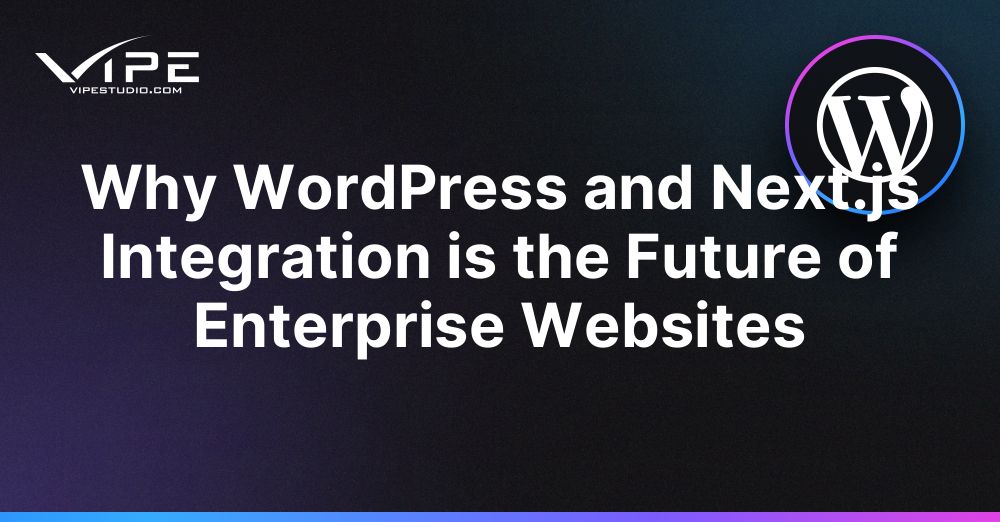01.11.2024
WordPress Development
Why WordPress and Next.js Integration is the Future of Enterprise Websites
READING TIME: MIN
Table of Content
For enterprise websites, achieving high performance and user satisfaction requires leveraging robust platforms capable of scaling with demand. The combination of WordPress and Next.js represents a powerful solution for businesses looking to enhance their online presence. Together, these tools provide flexibility, speed, and improved SEO, ensuring that enterprise sites are ready for high traffic and complex user needs. In this article, we’ll explore why integrating WordPress with Next.js has become a top strategy for modern enterprises and how it transforms website functionality and user experience.
Understanding WordPress as an Enterprise Content Management System (CMS)
WordPress is one of the most widely used content management systems (CMS) globally, known for its versatility and ease of use. Its extensive plugin ecosystem and open-source flexibility make it ideal for enterprise solutions that require custom features. However, WordPress on its own may not always meet the speed or SEO needs of enterprise sites with large content libraries or complex structures. Pairing WordPress with a front-end framework like Next.js addresses these concerns by offering a more modern and efficient way to serve content to users.
The Role of Next.js in Delivering Speed and Scalability
Next.js, a React-based framework, offers numerous advantages for front-end performance, particularly through server-side rendering (SSR) and static site generation (SSG). These features enable faster load times and smoother page transitions, significantly improving the user experience. For enterprises, Next.js can handle high traffic and complex page structures, making it a perfect fit for large-scale websites where speed is crucial. By integrating WordPress with Next.js, enterprises can use WordPress as a CMS while taking advantage of Next.js’s performance-boosting capabilities on the front end.
Enhancing Security with a Headless Setup
In a traditional WordPress setup, the back end is closely tied to the front end, which can expose the website to security vulnerabilities. With a headless setup using WordPress and Next.js, the front end is separated from the CMS, reducing potential access points for cyber threats. Enterprises, which prioritize security for their users’ data, benefit from this separation. By limiting direct access to the CMS, a headless WordPress architecture adds an additional layer of protection, ensuring sensitive information is safeguarded.
SEO Optimization through Server-Side Rendering in Next.js
Search engine optimization (SEO) is critical for enterprise websites looking to increase visibility and drive traffic. Next.js’s server-side rendering (SSR) capabilities provide a considerable advantage in this area. By rendering pages on the server before they reach the user, Next.js enables search engines to better index content, which can positively impact SEO rankings. For enterprises, this means improved discoverability in search engines, helping them stay competitive in the digital landscape.
How Vipe Studio Implements Seamless Integration of WordPress and Next.js
At Vipe Studio, we specialize in integrating WordPress with Next.js for enterprises seeking scalable, high-performance web solutions. Our team ensures that all elements—from API connections to front-end configuration—are seamlessly managed, providing businesses with a robust setup that can adapt to evolving digital demands.
If your enterprise is ready to unlock the advantages of a headless WordPress setup, reach out to Vipe Studio to learn more about how our tailored integration solutions can support your goals.
Conclusion: Embracing the Power of WordPress and Next.js for Enterprise Needs
The integration of WordPress and Next.js represents a future-ready approach to enterprise website development. By combining a versatile CMS with a high-performing front end, businesses can offer users a fast, secure, and SEO-friendly experience. As enterprises continue to adopt digital strategies that prioritize scalability and efficiency, the WordPress-Next.js integration stands out as a top solution for meeting these goals.
More on The Topic
- Navigating WooCommerce Performance: Real-World Strategies
- The Role of AI in WordPress Development Workflows
- Optimizing WordPress for Enterprise: Beyond Basic Caching
- WordPress and Headless Commerce: A Provocative Dilemma
- Decoupled WordPress Architecture: The Future or a Fad?
The content of this website is copyrighted and protected by Creative Commons 4.0.



